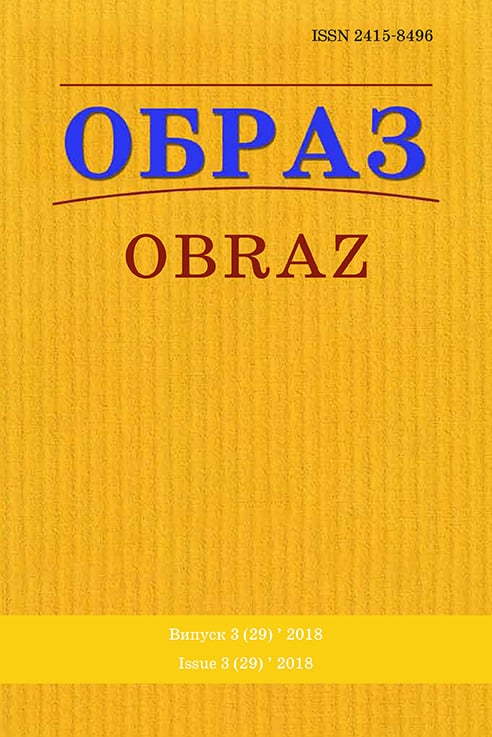Abstract
The aim of the study is to determine the dynamics of values in Ukrainian political video advertising and to trace transformation of its dominant values. Methods. The study was based on Ukrainian political video advertising of snap parliamentary elections in 2007 and 2014. The analysis involved 40 and 98 political video commercials respectively. In the process of research we used such methods as: deductive method was used for the transition from a common understanding of values to analysis of their using in advertising; analytical-synthetic procedure was used for a detailed review of the values in political advertising and revealing their main characteristics; quantitative and qualitative characteristics of values in commercials were determined through content analysis; the comparison made it possible to establish similarities and identify the differences between the values propagandized by Ukrainian political advertising in the period of parliamentary elections in 2007 and 2014. Results and conclusions. Relying on S. Schwartz classification the authors reached such conclusions in their research. Comparing values of Ukrainian political video advertising in 2007 with values in 2014, the changes of the Ukrainians’ value priorities are observed. So, in 2007 the dominant values in the election campaign were social order and stability, social justice, caring for the weaker ones. In 2014 the number of appeals to the named values has decreased, at the same time an appeal to national security comes to the fore, which is typical for each party. Quantitative indicators suggest that Ukrainian society in the period of parliamentary elections 2014 needed protection on the global scale - not only protection of the family, but protection of the whole nation. Besides this we observe hefty increase in appeals to peace, novelty and change in life. Frequency of appeals to respect for traditions and social recognition remains at the same level; appeals to values of self-esteem and freedom disappear, instead we observe appeals to wisdom, social force and respect for the opinions of other people.
References
1. Akopova, T. S. (2002), «Political advertising», lecture text, Yaroslavl State University, Yaroslavl, 63 p.
2. Voroshilova, M. B. (2013), «Political creolized text: keys to read», monograph, Ural State Pedagogical University, Yekaterinburg, 194 p.
3. Jiga, T. V. (2003), «Methods and technologies of influence of political advertising (on the example of the election campaign)», Thesis work for Cand. Sc. (Political science.), 23.00.03, Taras Shevchenko National University of Kyiv, Kyiv, 295 p.
4. Jewler, A. J. and Drewniany, B. L. (2003), «Creative strategy in advertising», Translated by Kaptuurevsky, Y. N., Piter, St. Petersburg, 384 p.
5. Ermaganbetova, A. A. and Sisembaeva, G. B. (2015) «The role and significance of symbols in modern advertising», Molodoy uchenyy, no. 22. – pp. 717–721.
6. Karandashev, V. N. «Schwartz method for studying personality values: concept and methodical manual», available at: http://dip-psi.ru/psikhologicheskiye-testy/post/metodika-shshvartsa-po-izucheniyu-tsennostnykh-oriyentatsiy (access November 18, 2018).
7. Kuznetsova, T. V. (2012), «Axiology of social communications», tutorial, Sumy State University Publishing House, Sumy, 300 p.
8. Kuznetsova, T. V. (2013), «To scientific understanding of the axiological function of the mass media», Zhurnalistska osvita na Sumshchyni: nabutky y problemy. Materialy Devyatoyi vseukrayinskoyi naukovo-praktychnoyi konferentsiyi [Journalism Education in Sumy Region: acquisitions and problems. Materials of the 9 th All-Ukrainian Scientific and Practical Conference], Sumy, Sumy State University, June 5-6, 2013, pp. 7-11.
9. Kurbatskaya, T. B. and Nurullina, G. M. (2016), « Political advertising: psychological expertise», Print-ekspress, Naberezhnye Chelny, 217 p.
10. Lisnychyy, V. V., Gryshchenko, V. O., Ivanov, V. M. and others (2004), «Contemporary Election PR «, tutorial, Profesional, Kyiv, 384 p.
11. Nazaikin, A. N. (2011), «Effective advertising text in the media», Moscow State University Publishing House, Faculty of Journalism, Lomonosov Moscow State University, Moscow, 480 p.
12. Pesotsky, Y. A. (2003) «Modern advertising. Theory and practice», Feniks, Rostov-onDon, 134 p.
13. Sociological dictionary (2008), ed.-in-chief Osipov, G. V. and Moskvichev, L. N., academic secretary Chernoshtek, O. E., Norma, Moscow, 608 p.
14. Stashchuk, I. P. (2016), «Axiological dimension of commercial advertising», Molodyy vchenyy, pp. 141–144.
15. Stashchuk, I. P. (2015), «Axiological studies of advertising communication in Ukrainian and foreign science: historiographic aspect», Molodyy vchenyy, pp. 224–228.
16. Tkachenko, O. N. and Marochkina, S. S. (2013), «The specifics of the visual execution of the advertising message», Omskiy nauchnyy vestnik, no.1 (115), pp. 212–214.
17. Ulyanovskiy, A. V. (2011), «Mythodesign in advertising», tutorial, Philological faculty of St. Petersburg State University, St. Petersburg, 168 p.
18. Wells, W., Bernett, J. and Moriarti, S. (1999) «Advertising: principles and practice», Translated by Krylov, I. V. and Ulyanovskiy, A. V., Piter, St. Petersburg, 736 p.
19. Schwartz, S. (2008), «Cultural value orientations: the nature and consequences of national differences», Psikhologiya, Zhurnal vysshey shkoly ekonomiki, Vol. 5, no. 2.
20. Yanenko, Y. V. (2013), «Valuable priorities of Ukrainian advertising in the XXI century», Sotsialno-humanitarni aspekty rozvytku suchasnoho suspilstva. Materialy Vseukrayinskoyi naukovoyi konferentsiyi vykladachiv, aspirantiv, spivrobitnykiv ta studentiv fakultetu inozemnoyi filolohiyi ta sotsialnykh komunikatsiy [Socio-humanitarian aspects of the development of modern society. Materials of the All-Ukrainian Scientific Conference for teachers, postgraduates, staff and students of the Faculty of Foreign Philology and Social Communications], Sumy, Sumy State University, April 19-20, part 3, 2013, pp. 116–117.

This work is licensed under a Creative Commons Attribution 4.0 International License.

